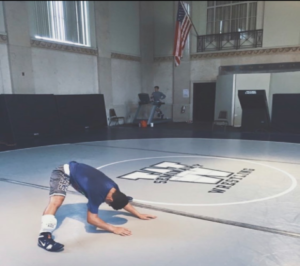Fall Sports During Covid-19
By Maddie Olshemski ’23
2020 was anything but ordinary, and the fall sports season was no exception to this. Although the fall season looked a bit different than past years, Wyoming Seminary student-athletes made the season the best and safest that they could. Wyoming Seminary fall sports include Football, Field Hockey, Tennis, Golf, Soccer, and Cross Country. The student-athletes on these teams persevered and made the year more memorable than any year before, despite the circumstances and obstacles the Covid-19 pandemic threw their way.
This fall season was like no other. Adjustments had to be made to fit Covid- 19 protocols and ensure everybody participating was safe as possible to have a season. This means masking at all times, except when playing, and social distancing during water breaks, drills, on the benches, and during bus rides. At a glance, it could be seen as a challenge, but sophomore soccer defender, Aiden Gilbert, talked about in an interview how these protocols brought the Boys Team together. He explained, “[W]e knew that wearing masks was our best chance at being able to keep the season going, so we made sure to keep that in the back of our minds when we felt like taking them off. And although we couldn’t go too close to each other, we all had to go through the same problems, so we were able to relate with each other on a greater scale and become closer as a team.” The Boy’s Soccer Team then came together at the end of their season and finished with a win in the PIAA AA District Championship.
The student-athletes were not the only ones who had to adapt and make adjustments this fall season. Coaches played a massive role in making sure all student-athletes had the best experience possible playing their sports. Head Field Hockey coach, Coach Karen Klassner, touched on some of the difficulties she and her 3-peat defending PIAA Class A State Championship Team faced. The main challenge she talked about was “[T]he uncertainty of current and future situations, and not knowing from day to day if it would be your last game.” This uncertainty was not just surrounding cases on each respective team but throughout the entire state. The season could have been cut short by several things, including cases within other SEM teams, within the SEM community, other school teams throughout the area, and cases throughout the state. Any of these factors could have ended the season for SEM athletic teams and teams in the entire conference and in the PIAA. But even with this uncertainty, Coach Klassner commended her team for pushing through, “…our team was great, they knew what they had to do and handled every situation knowing they were lucky to be playing.” The Field Hockey Team finished off an already memorable season with a win in the PIAA Class A State Championship, making them the only Pennsylvania team ever to win three State Titles in a row. An unbelievable feat in an even more unbelievable time.
To play a sport during a pandemic with so much uncertainty where the sport you love can be taken away at any given moment is a challenge. However, every Wyoming Seminary fall sport student-athlete knew how lucky they were to play while making memories and connections that will be cherished. No student-athlete will ever forget the year they overcame uncertainty and adversity in a global pandemic while playing the sport they loved in the blue and white.

